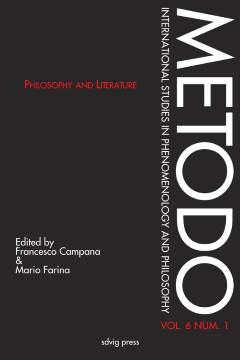Repository | Journal | Volume | Articles

(2018) Metodo 6 (1).
Meaning, experience, and the modern self
The phenomenology of spontaneous sense in Woolf's "Mrs. Dalloway"
Jacob Rump
pp. 317-355
By portraying meaning as a phenomenon that eludes complete expression and arises spontaneously in our everyday embodied interactions with others and objects in the world, as well as in our own unconscious registering of those interactions, Woolf’s Mrs. Dalloway is uniquely insightful concerning both the presence of meaning in modern life and the modern conception of the self–phenomena marked by a certain ineradicable tension between that which is constituted by us and that which is given from outside us. This paper examines this tension through the lens of Merleau-Ponty’s phenomenology, with special attention to the leitmotif of the «spontaneity of sense». Woolf and Merleau-Ponty both help to illustrate an important modern insight: that among the most meaningful experiences are those that are not only unexpected and unexplained, but in some sense foreign and unexplainable – mysterious events and yet everyday occurrences that explode the supposed privacy of our thoughts, and exceed our capacity for expression.
Publication details
Full citation:
Rump, J. (2018). Meaning, experience, and the modern self: The phenomenology of spontaneous sense in Woolf's "Mrs. Dalloway". Metodo 6 (1), pp. 317-355.
This text is available for download in the following format(s)
This document is available at an external location. Please follow the link below. Hold the CTRL button to open the link in a new window.



